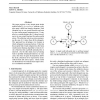104
click to vote
ACL
2009
14 years 12 months ago
2009
In this paper, we present a reinforcement learning approach for mapping natural language instructions to sequences of executable actions. We assume access to a reward function tha...
135
click to vote
NIPS
2004
15 years 3 months ago
2004
We consider an MDP setting in which the reward function is allowed to change during each time step of play (possibly in an adversarial manner), yet the dynamics remain fixed. Simi...
111
click to vote
NIPS
2007
15 years 3 months ago
2007
We study the problem of an apprentice learning to behave in an environment with an unknown reward function by observing the behavior of an expert. We follow on the work of Abbeel ...
156
click to vote
ESANN
2008
15 years 3 months ago
2008
In this paper the application of reinforcement learning to Tetris is investigated, particulary the idea of temporal difference learning is applied to estimate the state value funct...
112
click to vote
AAAI
2010
15 years 3 months ago
2010
The precise specification of reward functions for Markov decision processes (MDPs) is often extremely difficult, motivating research into both reward elicitation and the robust so...
134
click to vote
AAAI
2007
15 years 4 months ago
2007
In designing Markov Decision Processes (MDP), one must define the world, its dynamics, a set of actions, and a reward function. MDPs are often applied in situations where there i...
124
click to vote
SIGGRAPH
2010
ACM
15 years 6 months ago
2010
ACM
We present a method for inferring the behavior styles of character controllers from a small set of examples. We show that a rich set of behavior variations can be captured by dete...
109
click to vote
ISCAS
2006
IEEE
15 years 8 months ago
2006
IEEE
— This paper describes a general approach for the unsupervised learning of behaviors in a behavior-based robot. The key idea is to formalize a behavior produced by a Motor Map dr...
111
click to vote
PKDD
2009
Springer
15 years 8 months ago
2009
Springer
Abstract. Inverse reinforcement learning addresses the general problem of recovering a reward function from samples of a policy provided by an expert/demonstrator. In this paper, w...
103
click to vote
ICML
2003
IEEE
16 years 2 months ago
2003
IEEE
The paper explores a very simple agent design method called Q-decomposition, wherein a complex agent is built from simpler subagents. Each subagent has its own reward function and...

